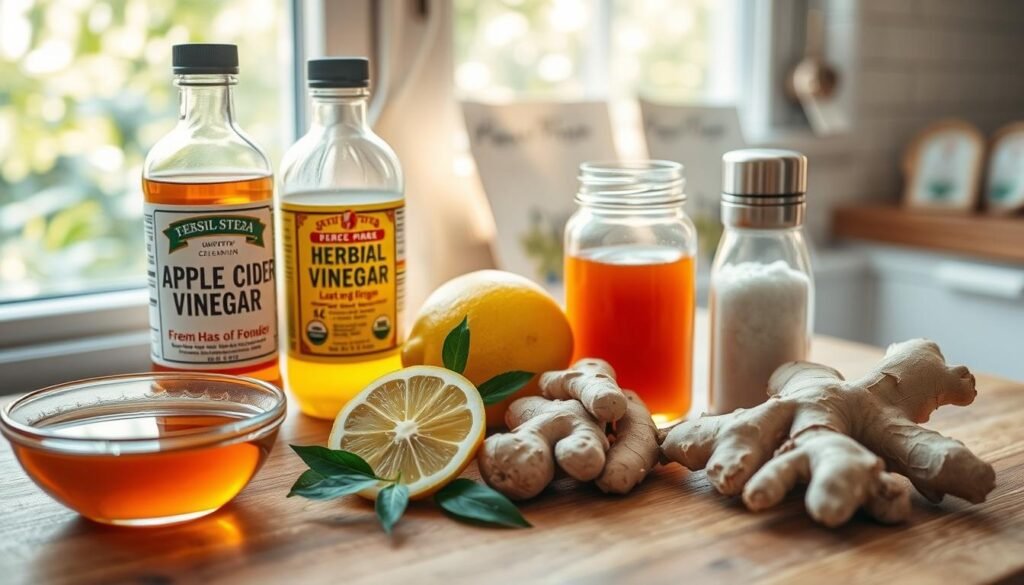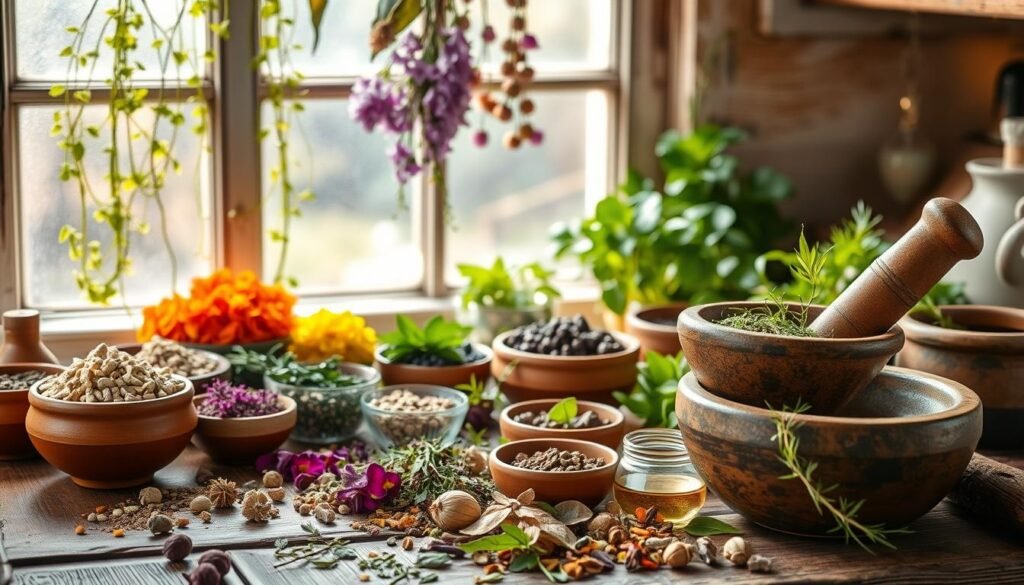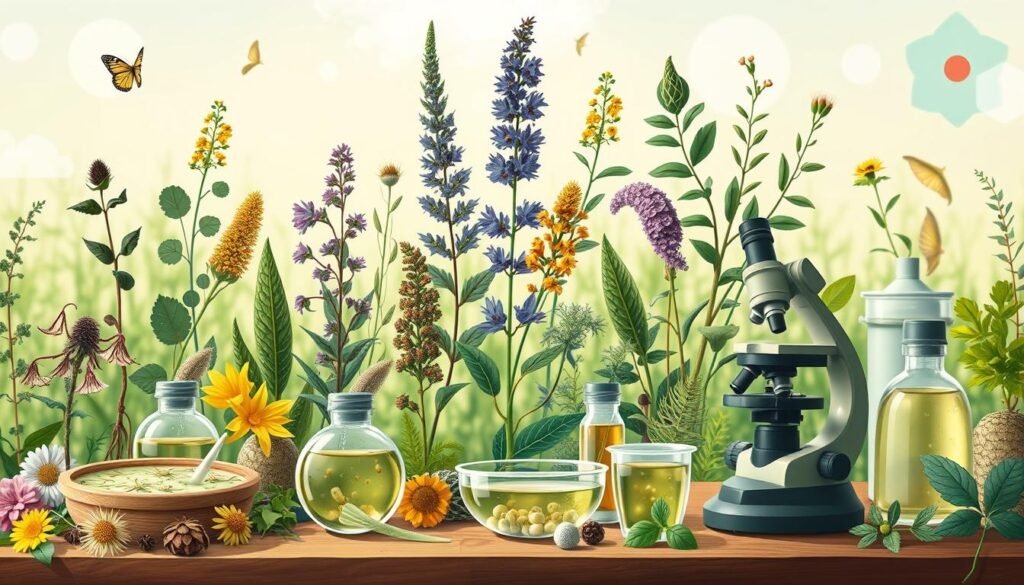Did you know nearly one in three U.S. adults use herbal supplements? These natural alternatives are not as tightly regulated as regular medicines. The FDA sees them as foods, not as drugs. So, they don’t go through the strict safety and labeling checks that medicines do. This fact raises questions about how safe and effective they are.
Herbal and non-herbal remedies have been healing people for hundreds of years. They help with colds, inflammation, and discomfort. Today, science is beginning to see how some of these natural cures can really help. This article explores all sorts of herbal and non-herbal remedies. It shows how we can use them alongside modern medicine for better health.
Key Takeaways
- Herbal supplement use is prevalent among U.S. adults.
- Herbal remedies are considered foods by the FDA and not subject to the same regulations as medications.
- Common herbs like garlic and ginseng are popular for various health benefits.
- It is crucial to consult healthcare providers before using herbal supplements.
- Safety concerns exist due to lack of standardization and testing of herbal products.
- Reliable resources are available for further information on herbal supplements.
Introduction to Natural Healing
Natural healing uses the body’s own power to heal and stay healthy. It follows a whole-person approach. This idea goes back to old times. For example, Ayurveda in India in the 6th century BC used plants for healing. People today explore Home Cures from old wisdom for natural options.
Since the 1960s, there’s been a big movement back to these natural methods. A key moment was the National Conference on Holistic Health in California in 1975. It talked about the importance of treating mind, body, and spirit together.
Now, many prefer holistic health remedies like acupuncture, aromatherapy, and yoga. These don’t just look at the illness. They treat the whole person. Holistic medicine means working together with doctors to care for your health.
There are loads of resources for those wanting to learn about natural healing. Courses cover everything from herbs to how to relax. This education helps people understand how natural healing and holistic health improve life.
By using natural sleep aids and home remedies, anyone can live a healthier life. This blends old traditions with new holistic views.
Understanding Herbal and Non-Herbal Home Remedies
More people are now looking into alternative healthcare. This includes the use of herbal and non-herbal home remedies. These options help with health maintenance and managing diseases naturally.
Definition and Importance
Herbal remedies come from plants. They use parts like roots, leaves, and flowers. Globally, people have used these natural options for centuries. For example, in areas like Africa and India, up to 90% and 70% of the populations, respectively, prefer traditional medicine. On the other hand, non-herbal remedies use common items like honey and vinegar. It’s important to understand the difference. This knowledge supports the growing acceptance of alternative medicine today.
Types of Remedies
There are many kinds of herbal and non-herbal remedies. Common herbal ones include:
- Chamomile: Often used for anxiety and relaxation.
- Echinacea: Aids in treating colds. Its effectiveness is still being studied.
- Garlic: Offers various health benefits, including inflammation reduction and heart support.
Non-herbal remedies use simple, healing ingredients like:
- Honey: Known for its soothing effects and antioxidants.
- Vinegar: Used in various treatments.
- Baking Soda: Helps with digestive issues.
Looking into these remedies shows their importance in health care. The herbal product market is worth about $60 billion a year. Its popularity keeps growing. Those wanting to learn more can check out detailed information on herbal and non-herbal home remedies at this informative article.
Benefits of Herbal Remedies
Herbal remedies are becoming more popular as an alternative to traditional medicine. They have a long history in many cultures, offering a comprehensive approach to health. People often choose herbs because they’re gentler and have fewer side effects than many drugs. Knowing their benefits can improve how we use them daily for better wellness.
Natural Anti-Inflammatory Properties
Many herbal remedies can reduce inflammation and pain. Turmeric and ginger are well-known for their benefits. Studies show turmeric’s curcumin works as well as some anti-inflammatory drugs. This shows the value of using common herbal remedies for health.
Boosting Immunity with Herbal Supplements
Herbal supplements can strengthen the immune system. Echinacea and shiitake mushrooms are key for this. They help build a better immune response. This use shows that old remedies are still useful for improving immunity today.
Common Herbal Remedies and Their Uses
There are many common herbal remedies for different health issues. Ginger helps with nausea, and peppermint is good for the stomach. Lavender helps ease anxiety with its calming effects. Learning about these remedies helps us use them confidently in daily life.
Popular Non-Herbal Home Remedies
Everyday items can be key in making home remedies work. Your kitchen holds more than just food; it has powerful tools for health. These ingredients help us heal naturally, reducing the need for medicine.
Everyday Ingredients for Healing
Common kitchen items can be strong non-herbal remedies. Many foods have healing powers, boosting our health every day. Honey, ginger, and apple cider vinegar are just a few examples.
- Honey: It’s not just sweet. Honey fights germs, helps with coughs, and speeds up wound healing.
- Ginger: Great for soothing upset stomachs, ginger also lessens inflammation.
- Apple Cider Vinegar: This kitchen staple aids digestion and adds zest to meals.
- Cayenne Pepper: With capsaicin, it’s a natural painkiller when used in creams.
- Turmeric: Known for fighting inflammation, turmeric has been a health go-to for centuries.

DIY Non-Herbal Remedies
Making your own health remedies is empowering. It’s about using what’s on hand to heal. Here’s how:
- Ginger tea can settle your stomach and warm your heart.
- A mix of cayenne pepper and oil can ease your pain.
- Honey and water can soothe a sore throat gently.
- Garlic oil is a tried-and-true earache fix.
- A turmeric paste can heal minor skin injuries.
These simple, natural solutions tackle everyday health issues. Using what you have at home makes staying healthy easy. It’s all about embracing natural, easy ways to feel better.
Effective Herbal Supplements for Health
Herbal supplements are popular because they offer health benefits. Many people looking for natural ways to improve health choose them. Knowing about these supplements helps make good choices.
Common Herbal Supplements and Their Benefits
Several herbal supplements stand out for their health benefits:
- Garlic: It supports heart health and protects brain cells with S-allyl cysteine.
- Ginkgo biloba: Used to improve memory and focus, especially in older adults.
- Echinacea: Boosts the immune system and fights viruses.
- Black Cohosh: Helps ease menopause symptoms and PMS, balancing hormones.
- Ginseng: Increases energy and improves both physical and mental health.
Precautions and Interactions with Medications
Herbal supplements offer benefits but can have risks, like affecting other medications. For example, St. John’s wort affects some antidepressants and birth control pills. It’s crucial to talk to a healthcare provider before starting supplements.
Be mindful of how supplements might interact with your medications. Discuss your health and any medicines with a doctor to stay safe.
For more tips on diet and health, read this article on Keto Insomnia. Learning about dietary effects helps manage supplement use and stay healthy.
Folk Remedies: Traditional Treatments Passed Down Generations
Folk remedies are a legacy of natural healing passed through time. They come from practices and beliefs of various cultures. This shows a shared understanding of health. The historic importance of these healing ways shows their role in modern medicine’s growth.
Historical Significance of Folk Remedies
Folk remedies show knowledge handed down for generations. They mix cultural practices with efforts to use nature for healing. Around 40% of today’s medicines come from these traditional methods. The work of Tu Youyou, a Nobel Prize winner for malaria treatment, shows traditional healing’s worth in fighting modern diseases.
Examples of Folk Remedies and Their Uses
Many folk remedies are still used, proving their lasting effect. Here are some known examples:
| Folk Remedy | Uses |
|---|---|
| Honey | Commonly used for cough relief |
| Ginger Tea | Helps with digestive issues |
| Willow Bark | Source of modern aspirin for pain relief |
| Turmeric | Known for anti-inflammatory properties |
| Aloe Vera | Utilized for skin healing and sunburns |
These folk remedies show how traditional knowledge helps today. They highlight the need to keep these treatments in modern health conversations.

Holistic Health Approaches Using Herbal and Non-Herbal Remedies
Understanding how the mind and body work together is key for holistic health. Using natural methods is part of a balanced way to stay well. Things like meditation and yoga help us relax and keep our minds and emotions healthy. By using herbal remedies, we can look after our health in more ways, exploring different parts of our wellness journey.
Mind-Body Connection and Natural Healing
The link between our minds and bodies shows how our feelings can affect our physical health. Doing activities like yoga, tai chi, and meditation helps us handle stress better and feel good overall. These practices make us more relaxed, less stressed, and support our whole health. When we add these into our lives, we find more balance and peace, helping us deal with health issues better.
Integrating Remedies into Daily Routine
Adding holistic practices into our daily lives can boost our natural healing process. Simple changes, such as choosing herbal teas over coffee or using essential oils, can make everyday habits part of our health routine. Using herbs like turmeric and ginger in cooking adds taste and health benefits. These changes help us follow a natural path to wellness, fitting holistic remedies into our day easily.
Talking with healthcare experts before starting these practices is important. This makes sure that adding herbs and other natural remedies fits with our health needs and medical care. Choosing a holistic health path strengthens our connection to our wellness, bringing balance with various healing practices. For more on these methods, check out this resource.
Scientific Evidence and Research on Home Cures
The interest in home remedies is growing fast. This has led to more scientific evidence supporting herbal cures. Traditional healing is now being looked at through science. More research means people learn how effective different remedies can be for health.
Research on the Effectiveness of Herbal Remedies
Herbal remedies are becoming popular alternatives to conventional medicine. Recent studies show turmeric’s curcumin helps reduce inflammation. Another study found cranberry juice lowers urinary tract infections in women who drink it often. Yet, it’s critical to look closely at each remedy, as not all are guaranteed to work.
A Cochrane review examined studies on cranberry juice for UTI prevention. The findings suggest cranberry might not be as effective as many think.

Challenges in Validating Non-Herbal Remedies
Many non-herbal remedies are well-liked, but their success stories are often just stories. Without validation by science, it’s hard to know if they truly work. The quality of ingredients and the right dosage play big roles. For example, garlic might lower cholesterol for some, but studies show mixed results on its effect on triglycerides or LDL levels.
This mix of results highlights the need for careful research and standards. Consumers should seek reliable sources for health solutions. Understanding non-herbal remedies better can lead to smarter health decisions. For deeper insights, NCCIH offers extensive research on natural products and science.
| Herbal Remedy | Effectiveness | Notable Research Findings |
|---|---|---|
| Turmeric (Curcumin) | Effective in reducing inflammation | Supports chronic pain management |
| Cranberry Juice | Can reduce UTI risk | Less effective than previously believed for prevention |
| Garlic | Moderately reduces cholesterol | Conflicting results on triglyceride and LDL/HDL effects |
| Ginger | Effective for nausea and indigestion | Widely used for morning sickness in pregnancy |
| Black Cohosh | Effective for menopausal symptoms | Clinical support for treating PMS |
Using Homeopathic Remedies for Common Ailments
Homeopathy began in the late 1700s in Germany. It’s a type of alternative medicine that uses very diluted substances to heal. Substances like red onion, poison ivy, and arnica target specific problems. They help kickstart the body’s own healing abilities.
Overview of Homeopathic Remedies
People often turn to homeopathy for common ailments. You can find these remedies in forms like pellets, drops, creams, and tablets. Homeopaths look at your unique symptoms. This includes your mental, emotional, and physical health. They then choose a remedy that’s just right for you. This way, even minor problems like bruises, toothaches, and colds can be managed.
In Europe, homeopathy is more popular than in the U.S. You can buy homeopathic products in many places. But, it’s important to pick high-quality options as they differ by brand.
Caution and Best Practices
It’s crucial to use homeopathy safely. Here are some tips:
- Always talk to healthcare professionals before starting homeopathic treatments, especially for ongoing issues.
- Stick to the recommended doses to prevent any unwanted effects or drug interactions.
- Remember, homeopathic remedies are not for serious conditions like asthma or heart disease.
- Know what you’re using, including what it’s for and any possible side effects.
Some people are skeptical about homeopathy, thinking it works only due to the placebo effect. However, many users report real benefits. The FDA does regulate these products. But they don’t undergo the same tests as standard drugs do. Knowing about homeopathy helps you make better choices for your health.
| Common Ailments | Homeopathic Remedies | Potential Benefits |
|---|---|---|
| Bruises | Arnica | Reduces swelling and pain |
| Fever | Belladonna | Lowers body temperature |
| Headaches | Natrum Muriaticum | Provides relief from migraines |
| Coughs | Historically Used Remedies | Helps soothe the throat |
| Colds | Aconitum | Supports recovery from symptoms |
Conclusion
The study of home remedies, both herbal and non-herbal, shows a deep interest in natural health alternatives. An article noted 157k accesses and 225 citations, proving the popularity of natural healing. From 1990 to 1997, the use of complementary medicine in the U.S. jumped from 34% to 42%.
This increase highlights a shift towards valuing natural remedies, especially among the well-educated. Herbal and non-herbal remedies bring many benefits. They can soothe stomach issues and improve mental health.
Research from 2020 confirms that plants have healing and protective effects. This has led to more people accepting natural healing methods. However, not all herbal remedies have been thoroughly tested. So, it’s important to proceed with caution when using them.
In sum, choosing natural healing methods allows people to take charge of their health. Ongoing research shows the benefits and potential of these remedies. It’s vital to use trustworthy information when adding them to your life. By doing this, you can maintain a healthy, balanced lifestyle.